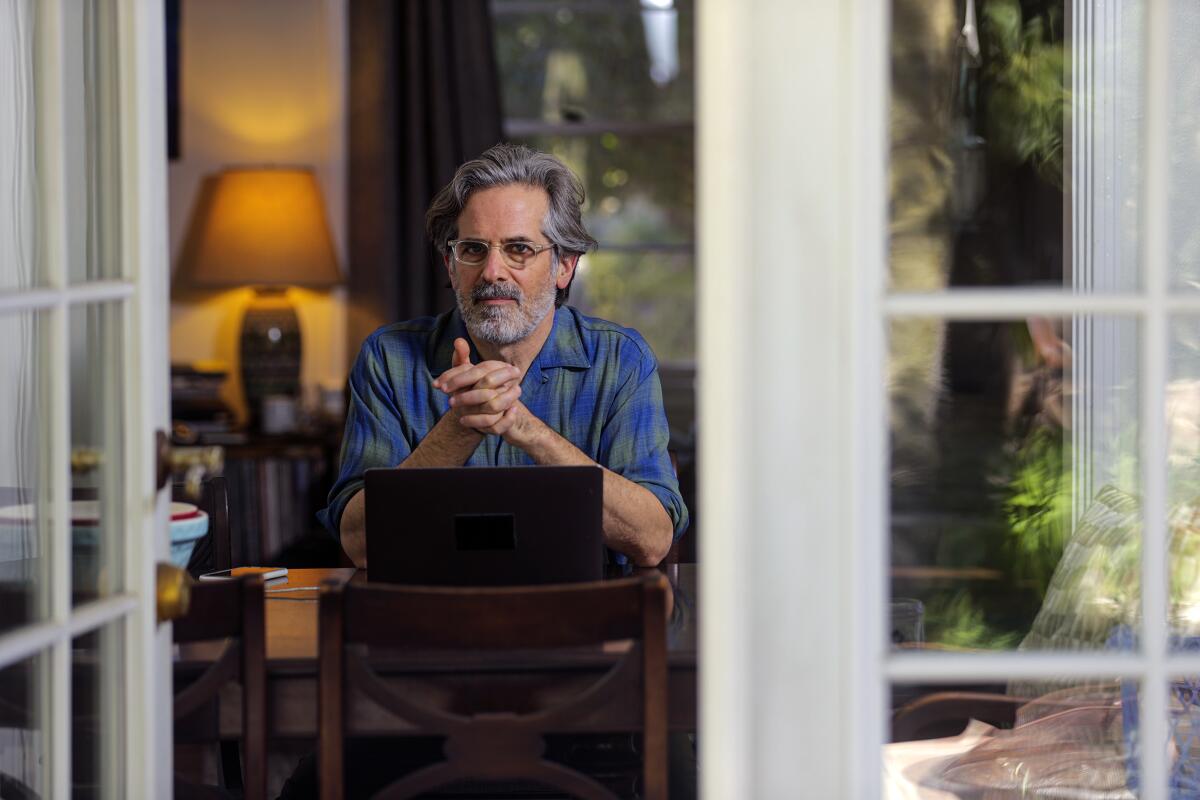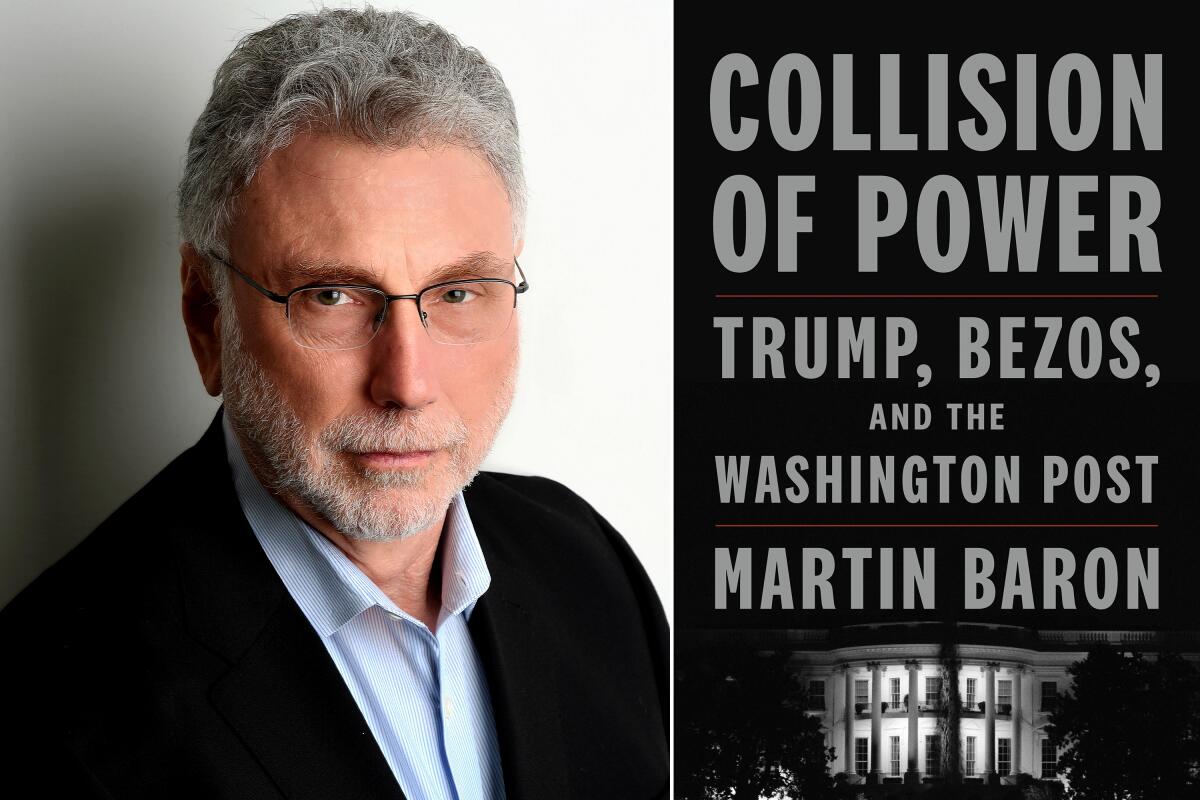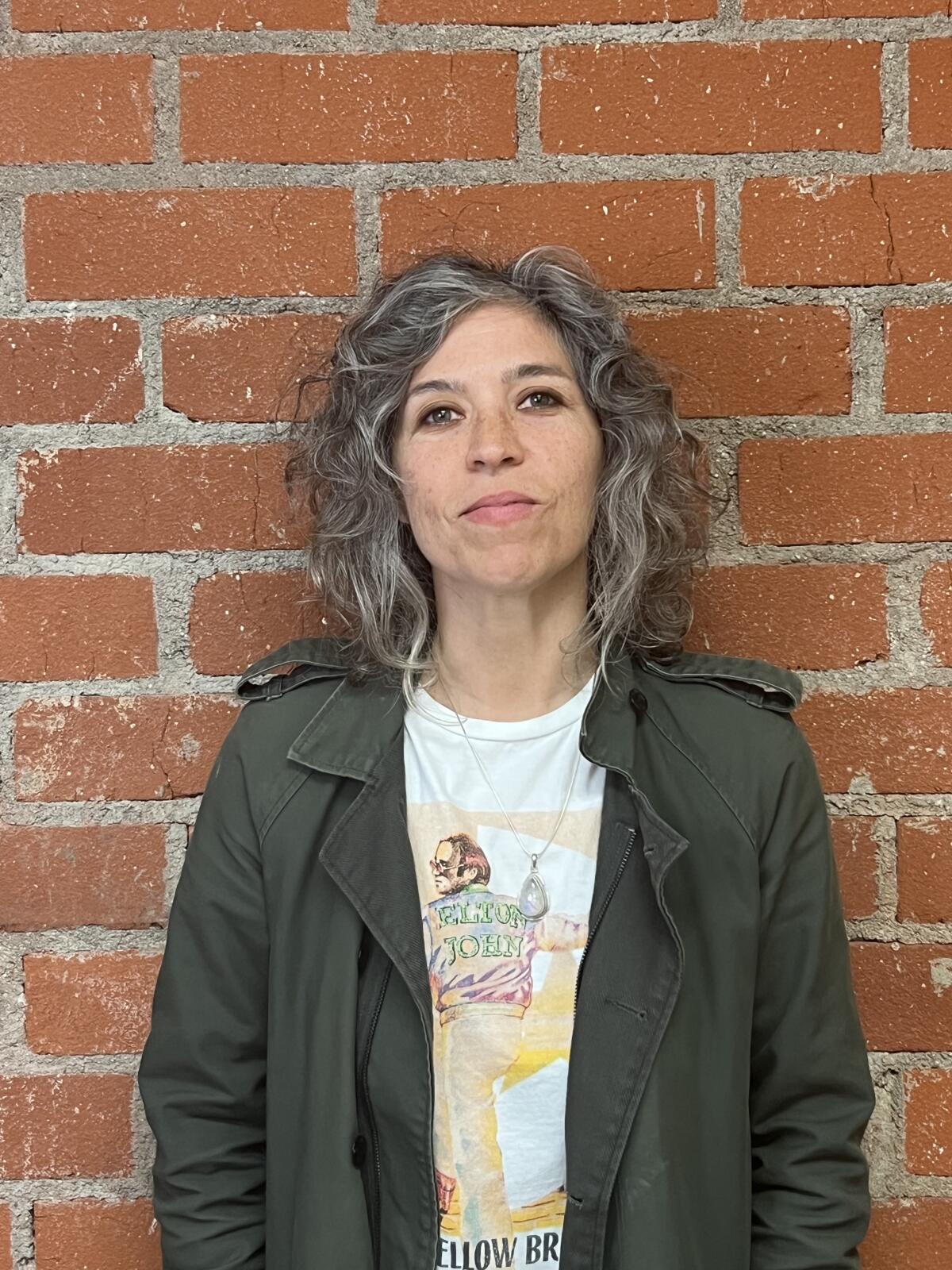Why Kerry Washington, Julia Fox and other celeb memoirists naysay ghostwriters

- Share via
Good morning, and welcome to the L.A. Times Book Club newsletter.
I’m Boris Kachka, the books editor at the Los Angeles Times, and I’ve been thinking about celebrities who write.
It’s celebrity-memoir season. This week alone, we’ve learned a lot about Kerry Washington (who shared some real talk with Times culture writer Marissa Evans) and fashion-meme and Kanye ex Julia Fox (subject of a gripping profile by contributor Ilana Kaplan). Over the next six weeks, we’ll see the confessions of Amy Schneider, Patrick Stewart, Barbra Streisand, John Stamos, Britney Spears and many others.
But wait: “Celebrities who write?” If that phrase caused you to cock an eyebrow, you know celebrity memoirs are often done in collaboration with writers, who can either be credited (J.R. Moehringer even wrote an essay about working on Prince Harry’s “Spare”) or contractually forbidden to speak of it even with blood relations. But the one thing Washington and Fox have in common — with each other and with Pamela Anderson — is that all have been vocal about writing their books themselves.
Sign up for our Book Club newsletter
Get the latest news, events and more from the Los Angeles Times Book Club, and help us get L.A. reading and talking.
You may occasionally receive promotional content from the Los Angeles Times.
Times columnist Amy Kaufman has profiled many celebrity memoirists — everyone from Emily Ratjakowski, Hayley Mills and Elliot Page (all of whom say they wrote their own) to reality TV stars (who definitely did not). For due diligence, she’ll talk to the books’ editors and research everyone in the acknowledgments (where many a ghostwriter is vaguely but effusively thanked).
Kaufman believes the stigma has declined in the social media/reality TV era. In 2014, a fight broke out on “The Real Housewives of New York” over mutual ghostwriting accusations; a few short years later, the “Beverly Hills” edition featured a cameo from Erika Jayne’s ghostwriter, and Caitlyn Jenner’s co-writer, Buzz Bissinger, got his own documentary. “If you’re a comedian or do some of your own writing and you have a ghostwriter? No,” Kaufman says. “But basically any reality star, I think it’s fine.”
In fact, she often prefers it. Kaufman can think of a few memoirs that would have been better organized if the writers had more help. And she knows one prominent journalist who hired freelance editors to organize material they didn’t have time to handle themselves.

In fact, it’s best to think of ghostwriting not as a binary, but a spectrum. Some figures — especially more established ones — will simply speak into a tape recorder and send the writer off to work. Some insist on preserving every malapropism as their own voice. But the majority live in the in-between.
“I assume in most cases that there’s somebody else involved,” says Times culture columnist Mary McNamara, who reviewed Anderson’s “Love, Pamela” as well as Harry’s “Spare.” She thought the former “was much more raw and a bit all over the place” than traditional celebrity memoirs. “I feel like she wanted to sound like herself talking, as opposed to the Harry biography, where you very much felt a writer involved.”
A professional writer can add context, fix memories in time and, of course, weave a story together. But a memoirist on a tear can feel more intimate. “I think there is an acceptance of less perfect writing or organization in exchange for a feeling of authenticity,” McNamara says.
This week, Fox told interviewer Jia Tolentino, “I sent my editor at Simon & Schuster the first draft, and he was, like, Great! And I was, like, Wait a minute. Like, no. So I went off and reread it and edited it. … I was really hoping someone else would just make it better.”
This led journalist Choire Sicha to post on X: “Julia Fox has learned the dark open secret of publishing which is that book editors don’t edit.” Whether you believe or agree with Fox and Sicha, a universal truth emerges. Authenticity may be the coin of the realm, but everyone could use an editor.
Next Book Club
Back to books by seasoned writers: There’s still time to get your ticket for the Times Book Club on Sunday to see Walter Isaacson discuss his biography “Elon Musk” — his only L.A. event — with Times columnist Anita Chabria. She is sure to come with probing questions now that the book has been thoroughly digested. So bring your copy, reserve your ticket on Eventbrite and while you’re there, send your own questions for the biographer (or send an email to bookclub@latimes.com).
The week in books
For a celebrity-free list of books to read in October, Bethanne Patrick is out with her 10 most anticipated works of fiction and nonfiction for the month, and it’s a good one: mind-bending new fiction from Jesmyn Ward, Benjamin Labutat and Walter Mosley; culturally astute memoirs from Safiya Sinclair and Viet Thanh Nguyen and more.

The hit debut that fell in the forest. California author C Pam Zhang’s first novel, “How Much of These Hills Is Gold,” was a success, but in the thick of lockdowns, she told Times contributor Lorraine Berry, “It felt like putting a book out to a room full of ghosts.” She used that feeling in constructing her lush, dystopian followup, “Land of Milk and Honey.”
The trailblazer toll. Two writers tackle the pains of being first: Alejandra Campoverdi, who rose from childhood on welfare to Barack Obama’s White House, talks to Times columnist Jean Guerrero about her memoir, “First Gen.” And author Sofia Samatar reviews Mohamed Mbougar Sarr’s novel “The Most Secret Memory of Men,” which won France’s Prix Goncourt — the first for someone of sub-Saharan origin — for fictionalizing a trailblazing French Malian novelist who was exiled and erased.
Body-switching caper as a transgender metaphor. In Isle McElroy’s “People Collide,” a straight couple switch bodies in a novel that places “a heterosexual romance arc inside a gender transition novel,” as critic Noah Berlatsky writes. And over on The Cut, McElroy, who is nonbinary, describes an increasingly common experience: coping with a previous book that was written under what is now a deadname.
Jonathan Lethem can’t quit Brooklyn. Exactly 20 years ago, Lethem earned acclaim for “The Fortress of Solitude,” which somewhat romanticized his hardscrabble upbringing in Boerum Hill, Brooklyn. Now a longtime Ponoma College professor, he returns to the subject in “Brooklyn Crime Novel,” which — writes contributor Lauren LeBlanc — in many ways atones for his complicity in “gentrifying gentrification.” Lethem pops into Skylight Books on Monday, Oct. 2, to discuss the book with Danzy Senna.

Tom Wolfe and the book-partygoers. Contributing film critic Robert Abele finds the new documentary “Radical Wolfe” intriguing but a little short on revelations about the late, dapper New Journalist. Yet elsewhere it feels as if literary glamour is having a moment. A Washington Post report on the party for a new book by Gay Talese, 91, taps into a bygone “literary golden age,” while a New York Times visit to the launch of Michael Wolff’s “The Fall,” on the decline of Fox, marvels at his talent for gathering strange political bedfellows.
Another icon of the golden age died just last week: Gita Mehta, a prolific author whose work reframed India and reclaimed it from the Western gaze, was also the widow of equally iconic Knopf publisher Sonny Mehta, who ran the prestigious imprint for 32 years before he died in 2019.
The hardest-working book-banner. Also in the Post, Hannah Natanson tees off the astonishing fact that 11 people are responsible for 60 percent of U.S. schoolbook challenges to profile Jennifer Peterson, who has challenged 71 books and reads one per night, bookmarking all the dirty parts and reading them aloud at school board meetings.
For a palate cleanser, check out this video essay on an awesome library boat, which brings books to far-flung villages in the fjords of northern Norway.
Talks around town

Get ready for the L.A. Times Book Club equivalent of a super blue moon — a second October event. Less than two weeks after Isaacson’s appearance, former Washington Post Editor Martin Baron comes to the Annenberg Forum to speak with Times Executive Editor Kevin Merida about his memoir, “Collision of Power: Trump, Bezos, and Washington Post.” Get tickets to the Oct. 11 event, and send in your questions, at Eventbrite. And study up by reading the L.A. Times review of Baron’s book as well as Adam Nagourney’s new newspaper history, “The Times” (on the other Times), by Julia M. Klein, a former editor at the Philadelphia Inquirer.
An interesting match-up on what tech has wrought: Brian Merchant, the technology columnist at The Times who wrote our great “Elon Musk” review, has a new book out, “Blood in the Machine,” that reframes the much-derided Luddites as forerunners of the resistance to automation and AI (see his sharp recent column on the WGA strike). On Oct. 19 he joins Taylor Lorenz, a Washington Post reporter and author of “Extremely Online: The Untold Story of Fame, Influence, and Power on the Internet,” for a conversation on tech and power at Exposition Park.
Bookstore Faves: Book Soup
Every couple of weeks, we’ll ask an L.A. bookseller what they’re selling and what they’re loving. This time: Book Soup manager Jessica Amodeo takes a free-form approach to our questionnaire.

Guitar chords are strumming through the store. Cidny Bullens’ voice sounds like gold. I’m sitting at my desk as he reads from his book, “TransElectric.” I wish I were in the audience. I wish I had more time to read, but I’m working. I pick up a copy of Cidny’s book from the register, open up to pages describing the times he ordered room service with Sir Elton John. We have a painting of Elton at the front of the store. A rock ‘n’ roll tour guide brings a group of tourists here almost every day, points to the patron saint of Book Soup and leaves. He never gives them enough time to purchase anything.
Mona Awad came by last week and signed copies of her new book, “Rouge.” I recommended her earlier novel, “Bunny,” to a customer who was looking for something erotic and dark. She came into the store screaming that she needed to speak to someone who reads books. I also gave her a copy of “The Sun Also Rises” by Ernest Hemingway and told her it was a classic. She wanted books about affairs.
Awad said she bought a copy of “Demian” by Hermann Hesse here when she was 17 and it changed her life. Similar things have happened to me. I still own a copy of Denis Johnson’s “Jesus’ Son” that I purchased at Book Soup almost 20 years ago. I still have “Tales of Ordinary Madness” by Charles Bukowski, which brought me to John Fante’s “Ask the Dust” — a book I will always recommend because I’m a writer and I’m from L.A. and it makes me feel alive.
Zadie Smith’s “The Fraud” is sitting on my desk. The artwork is striking. Hannah, our supervisor in charge of bestsellers, can’t wait to read it. I used to study Smith’s essays and will always remember her advice about putting your work away in a drawer for as long as you can.
After Awad left, Sofia Coppola came in. It was a big day. Our assistant manager, Madeleine, led Coppola up the stairs to sign copies of her new book, “Archive.” We sold out in two days. Coppola asked Madeleine what she was reading. “Mrs. Dalloway,” she said. They both attempted to read Virginia Woolf at a young age and eventually found their way back.
I just received an email from Riverhead announcing Miranda July’s upcoming book “All Fours” and haven’t been this excited for something new in a long time. Maxim Loskutoff’s “Old King” comes out in June 2024. I’m looking forward to spending some time with this wise, longtime friend of mine, and understanding the world through his eyes.
Sign up for our Book Club newsletter
Get the latest news, events and more from the Los Angeles Times Book Club, and help us get L.A. reading and talking.
You may occasionally receive promotional content from the Los Angeles Times.




